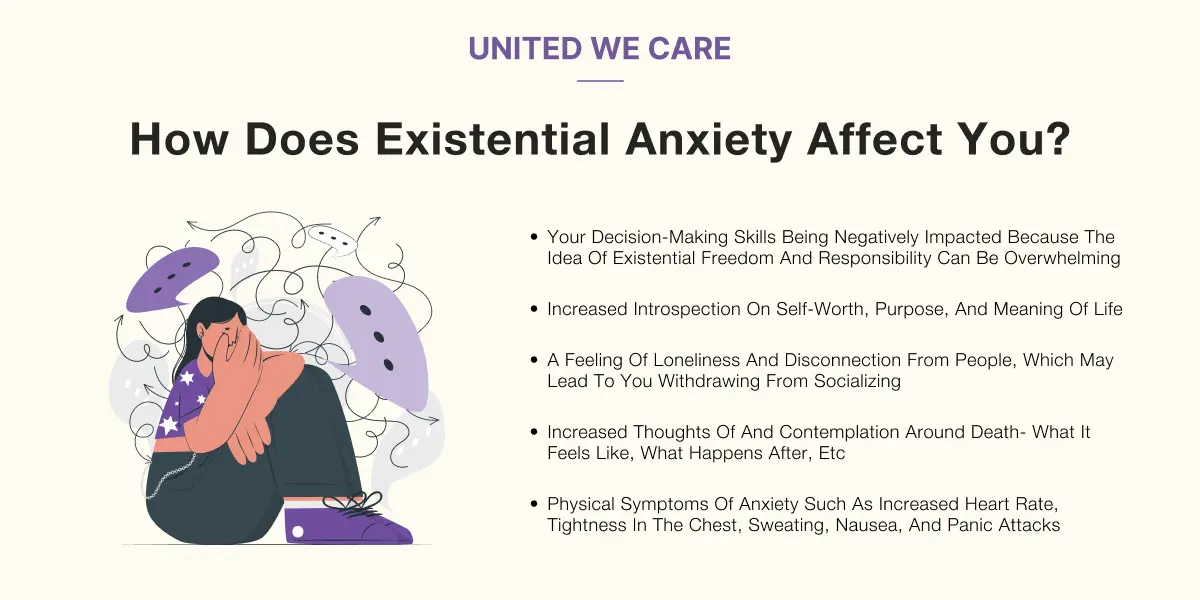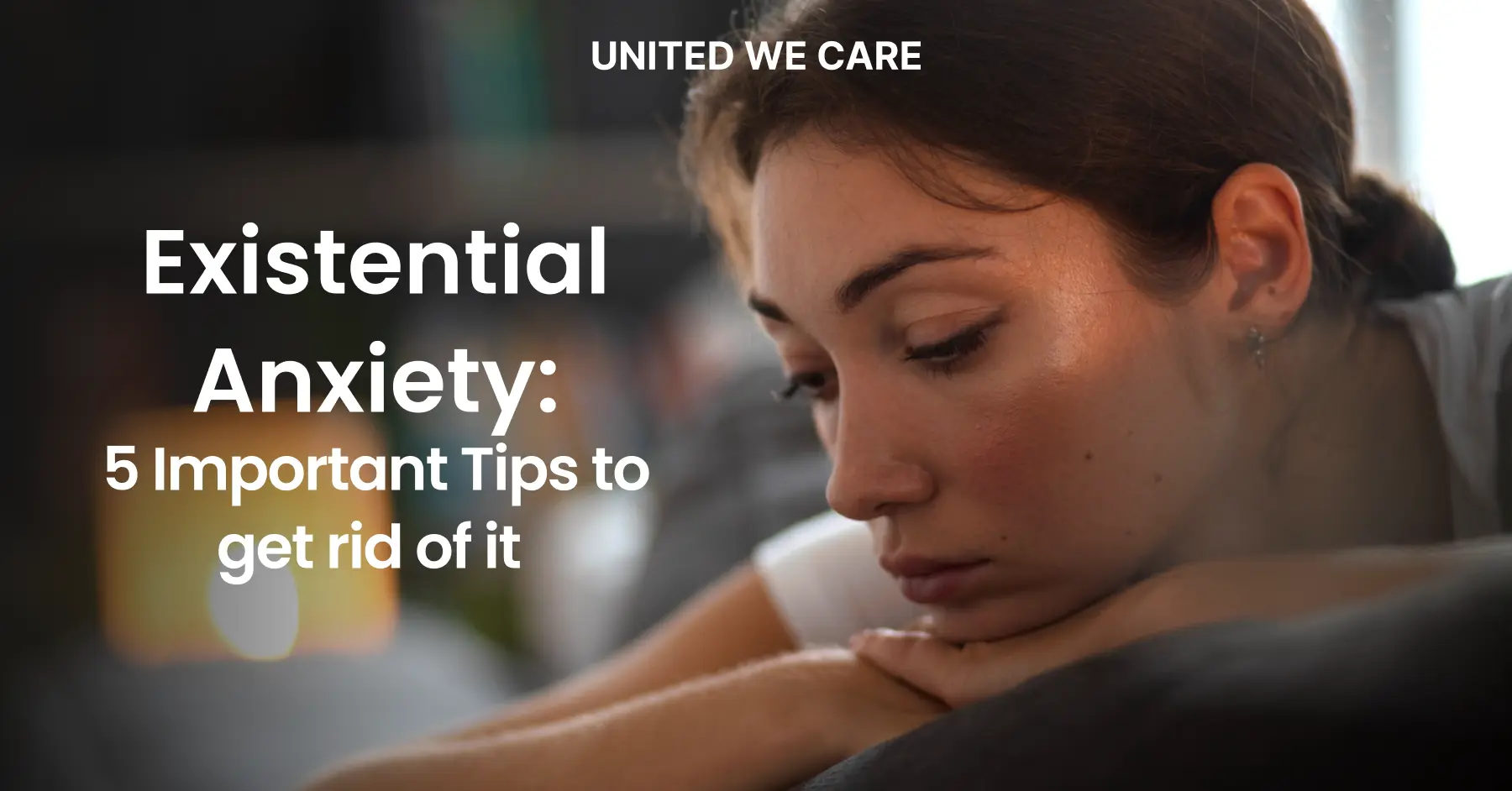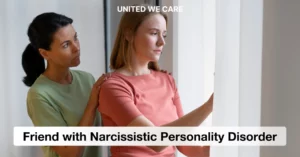Introduction
The purpose of human existence has been a topic of study and debate ever since the dawn of philosophy during the time of ancient Greece. The philosophical study of the human experience and the idea that humans have free will to discover the purpose and meaning of life is called existentialism. Existentialists believe that this freedom and responsibility can result in existential anxiety.
In this blog, focus on existential anxiety, how it can affect you, finding meaning in the work you do, coping strategies, and therapy options.
What is Existential Anxiety?
What is my purpose in this life? Where do we go when we die? Do my actions mean anything? What is the true meaning of life?
It’s natural to wonder about these things; it’s a part of our human experience and spiritual evolution. There is no one or right answer to these questions since our existence is a complex subject. When thoughts around this theme become intrusive and are accompanied by an intense fear due to not knowing the answers, it is known as existential anxiety.
Feeling despair and dread over your freedom to make choices and your responsibility for their consequences, over your existence being devoid of any meaning, and the inevitability of death are all characteristics of existential anxiety. [1]
When this anxiety goes unchecked and untreated, it may start interfering with your daily functioning and result in an existential crisis. An existential crisis can be characterized by intense internal conflict, which may make you feel that life is meaningless and create confusion around your identity. [2] It is accompanied by symptoms of anxiety and depression, feeling isolated and lonely, and lack of motivation.
Common Triggers Of Existential Anxiety
- Death of a loved one and experiencing intense grief
- Traumatic events such as an accident or getting diagnosed with a terminal illness
- Major life events like getting married or having children and changes such as moving
- Feeling stuck in your job or career can make you anxious about your direction or accomplishments
- Aging and entering certain age brackets, such as the 30s with increased societal expectations or 60s with major life changes such as retirement
- Excessive use of social media, comparing self to others, and feeling emotional loneliness
- Societal and environmental factors such as political unrest, climate change, and natural disasters, and the Covid-19 pandemic
Existential freedom
Freedom in existentialism is the idea that human beings possess absolute freedom, meaning they are not determined by external factors or pre-existing essence and are therefore responsible for creating their ‘own’ meaning and purpose in life.[3] This freedom comes with taking complete responsibility for one’s choices, which, while liberating, brings with it a certain kind of burden and anxiety of defining your own life with authenticity.
How Does Existential Anxiety Affect You?
Existential anxiety can be accompanied by despair and distress. You may experience: [4]

- Your decision-making skills being negatively impacted because the idea of existential freedom and responsibility can be overwhelming
- Increased introspection on self-worth, purpose, and meaning of life
- A feeling of loneliness and disconnection from people, which may lead to you withdrawing from socializing
- Increased thoughts of and contemplation around death- what it feels like, what happens after, etc
- Physical symptoms of anxiety such as increased heart rate, tightness in the chest, sweating, nausea, and panic attacks
Now we’ve fully acknowledged the kind of upheaval that experiencing existential anxiety can bring to your life, we must also acknowledge that this experience can be an immense period of growth for you. Confronting your fears and learning to cope with the anxiety can help you create a deeper level of self-awareness, live mindfully, define your own life and reality, and find fulfillment.
Existential Anxiety In the Workplace
Existential anxiety impacts all aspects of an individual’s life, including their work. Studies show that post-pandemic, more and more people are focused on what makes their lives feel fulfilling and are reevaluating how work fits into their lives, influencing their job-related behavior and decision-making. [5]
A workplace powered by meaning can support the existential needs of its employees by
- Look beyond salary and listening to and providing what the employee truly needs for meaning in life. This can be in the form of providing flexibility, such as remote or hybrid work, and actively creating a culture that prioritizes work-life balance.
- Believing that all jobs, regardless of their position, are meaningful and important and make the employees feel and realize the same.
- Providing in-person social activities to bridge the gap in connection that can happen in remote work. Creating a mentorship model that can pair different employees together can also help.
5 Important Tips to Get Rid of Existential Anxiety
Coping with existential anxiety is more about learning to live well despite these feelings and less about eliminating it.
- Learning to accept the uncertainty of life and letting go of the need to control it can help. By creating awareness around what your triggers are, you can learn to actively shift your thoughts during those times.
- A gratitude practice can also help keep things in perspective.
- You can even explore activities that excite you and make you feel fulfilled and actively spend time doing them.
- Nurturing present or new relationships can also make you feel supported.
- If your existential anxiety is interfering with your daily life and tasks and if you feel stuck and unable to help yourself, it’s best to seek professional help.
Therapy for Existential Anxiety
Therapy is an effective way to address your existential anxiety. A therapist can help you become more aware of your needs, the changes you need to make, and how to live life with acceptance, and even create a sense of connection and accountability. Some commonly used therapies to deal with existential anxiety are existential therapy, cognitive-behavioral therapy (CBT), logotherapy, and acceptance and commitment therapy (ACT). [6]
Suppose your existential anxiety is one of the manifestations of an underlying mental health condition such as an anxiety disorder or depression. In that case, your therapist may refer you to a psychiatrist or a doctor, who may prescribe medication to treat the symptoms of those conditions.
Conclusion
It is natural to wonder about things like the meaning of existence and death. However, if these thoughts get frequent and overwhelming, they may cause existential anxiety. While there are self-help strategies that you can use to deal with these feelings, it is best to seek professional help as it can aid your healing and growth in a structured manner. If you are experiencing an existential crisis, book a session with one of our mental health experts on United We Care, who can help you with the right coping strategies.
References
[1] American Psychological Association, “Existential Anxiety,” in APA Dictionary of Psychology. [Online]. Available: https://dictionary.apa.org/existential-anxiety. Accessed: Dec. 30, 2023.
[2] M. Andrews, “The existential crisis,” Behavioral Development Bulletin, vol. 21, no. 1, pp. 104–109, 2016. [Online]. Available: https://doi.org/10.1037/bdb0000014. Accessed: Dec. 30, 2023.
[3] Elijah Akinbode, “Jean-Paul Sartre’s Existential Freedom: A Critical Analysis,” International Journal of European Studies. [Online]. Available: https://philarchive.org/archive/AKIJSE. Accessed: Dec. 30, 2023.
[4] M. Andrews, “The existential crisis,” Behavioral Development Bulletin, vol. 21, no. 1, pp. 104-109, 2016. [Online]. Available: https://psycnet.apa.org/fulltext/2016-29917-010.html. Accessed: Dec. 30, 2023.
[5] Clay Routledge, “You Can’t Cure Your Employee’s Existential Crisis. But You Can Help,” Harvard Business Review. [Online]. Available: https://hbr.org/2021/06/you-cant-cure-your-employees-existential-crisis-but-you-can-help. Accessed: Dec. 30, 2023.
[6] J. Vos, M. Craig, and M. Cooper, “Existential therapies: A meta-analysis of their effects on psychological outcomes,” Journal of Consulting and Clinical Psychology, vol. 83, no. 1, pp. 115–128, 2015. [Online]. Available: https://doi.org/10.1037/a0037167. Accessed: Dec. 30, 2023.










